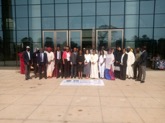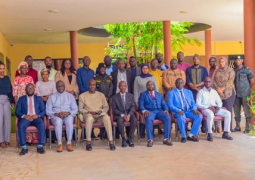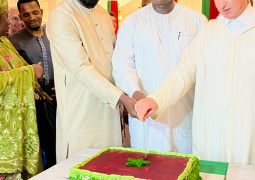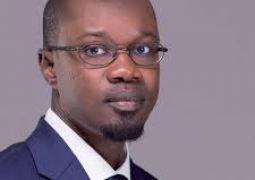
The Judges’ Forum was coordinated by NATCOM UNESCO - The Gambia and funded by UNESCO Dakar which brought together experts and competent dignitaries from the UN system, judiciary, GBA, international trainers from UNESCO and others.
In her opening remarks, Mrs. Maimuna Sidibeh, acting secretary general, NATCOM UNESCO – The Gambia, said freedom of speech is not just a human right, “but the fundamental human right.”
Without this right, she said, all other rights are in jeopardy, adding that freedom of speech is intensely present at the intersection between law and ethics.
The acting SG said the dialogue with the judiciary system was a dialogue used to highlight how the rights to freedom of expression and access to information help to promote and protect the particular rights under focus in the agenda of the judges' and magistrates’ dialogue.
"This initiative is a work that UNESCO is doing to promote knowledge of international and regional standards for freedom of expression within Africa’s judicial processes,” she added.
“UNESCO works with African governments and stakeholders to replace colonial-era laws with legal instruments that are more suited to Africa’s Agenda 2063, and which are also more conducive to achieving the universal Sustainable Development Goals – especially the goal that calls for public access to information and fundamental freedoms.”
She disclosed UNESCO has memoranda of cooperation with the African Court of Human and Peoples’ Rights, the ECOWAS Court, the Inter-American Court of Human Rights, the Ibero-American Summit of Judges and the Latin American prosecutor’s association, and operates various training programmes for judges. This she said has now involved over 12000 people in the judiciary in Latin America, while a pilot one in Africa has reached 1800 and intends to continue on a larger scale in the future.
Seraphine Wakana, the resident coordinator of the United Nations System in The Gambia commended UNESCO for the initiative, while thanking the Judiciary of The Gambia for their receptiveness to collaborate in this important event.
She recalled that this year, the UN system commemorated the 75th anniversary of the Universal Declaration for Human Rights (UDHR) with outlines of various rights, including freedom of expression.
She expressed that the dialogue contributed to the improvement of national standards and practices relating to the guarantee of freedom of expression, access to information, and safety of journalists which is pertinent as it highlights the UDHR’s promise in promoting freedom of expression.
“The Gambia has embarked on a path of democratic governance including legislative reforms. The country has also registered progress in media freedoms. The World Press Freedom ranking by Reporters Without Borders indicates that Gambia moved from 147th position in the world in 2017 to 50th position in 2022, a commendable improvement,” she noted.
Speaking on behalf of the Hon Chief Justice, Justice Mary Mam Yassin Sey, said freedom of expression is a fundamental human right enshrined in Article 19 of the Universal Declaration of Human Rights of 1948. And Article 25 of the 1997 Constitution of The Gambia guarantees every person the right to freedom of speech and expression.
Under regional mechanisms, she noted that Article 9 (2) of the African Charter on Human and Peoples’ Rights provides that every individual shall have the right to express and disseminate his opinions within the law.
However, she noted that the Judiciary welcomed the important dialogue which “we believe would contribute to raising awareness about such fundamental human right, as well as strengthening the capacity of different stakeholders to uphold freedom of expression, and to promote better frameworks through which this right is recognized, guaranteed and respected.”
Other speakers at the opening of the forum included Hon Husseini Thomasi- Solicitor General, the international trainers - Prof Hellen and Mr Prateek Sibal UNESCO trainers.




